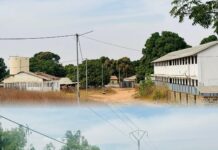Representatives of artisanal fishermen have called on the Gambia government to regulate the operations of semi-industrial fishing vessels in the country.
They say the operations of these vessels are only anchored on administrative directives, but not based on the laws of the Gambia, including the Fisheries Act.
They made this call on Saturday 11th June 2022 at the Tanji fish-landing center, where they held a day-long sensitization meeting organized in collaboration with the West African Association for the Development Artisanal Fisheries, WADAF.
The event centered on advocacy and awareness-raising on the need for transparency in the fisheries sector, and for the sustainable management of critical stocks and coastal sites for small pelagic resources.
According to the participants, the unregulated operations of the semi-industrial fishing vessels in Gambian waters have hindered progress in the artisanal fishing sub-sector.
They argue that the unregulated activities of these vessels which engage in fishing in areas designated for the artisanal fisherfolk have not helped matters.
“We (fisheries stakeholders) have had a retreat at Sindola in the past and from there we came to Atlantic Hotel where we did the validation. At that validation we the representatives of the artisanal fisheries have raised the issue of the semi-industrial vessels, and we called for their banning,” said Fatou B. Choi, deputy coordinator of the Small Pelagic Coalition.
She added: “Right now, if you go to the ports most of the catches being offloaded are brought in by semi-industrial vessels; they are catching the same species as the artisanal fishermen.”
Omar Gaye, a member of the coalition, also said the operations of the vessels are based on a mere administrative arrangement that needs to be abrogated.
According to him, these vessel operations within the zones designated for the artisanal fishermen frequently result in complaints by the latter of intrusion into their fishing territory, destruction of nets, and low catches, among others.
“We will not relent in pushing the government to stop them from operating there, and also to put in place an annual period of closure of all fishing activities for both types of vessel, as observed in Senegal and other countries. It is only in the Gambia that their operations are not subjected to seasonal closure,” Gaye added.
Bamfa Dampha, a Fisheries expert who graced the event, confirmed that the operations of semi-industrial vessels is an administrative arrangement, but not enshrined in the Fisheries Act nor any fisheries regulations.
He added that it will be extremely difficult to attempt to prosecute the owner or companies operating the semi-industrial vessels in the country, because of the absence of any existing law to guide their operations.
Concerning the industrial fishing trawlers, Dampha said the sector is regulated by law, for their operations beyond nine (9) nautical miles from the shore, which allows fish species to sprawl and reproduces without being subjected to harvesting at a juvenile stage.
He added that the nine nautical miles within which industrial vessels are not allowed to operate are specifically reserved for the artisanal fishing industry.
This is the reason why the artisanal fishing industry experiences seasonal closure of all fishing activities, but not industrial fishing vessels, Dampha explained.
Mousa Mbengue, Executive Secretary of WADAF, advised the members of the coalition to scrutinize the country’s fisheries law
and regulations, to identify the gaps and where necessary work with the national authorities to put in place laws that will allow the legal operations of all players.
WADAF will continue to provide training and sensitization courses for actors in the area of small pelagic resources in West Africa, he added.






